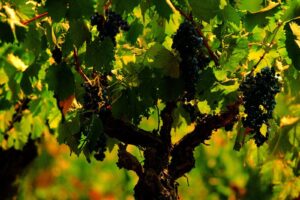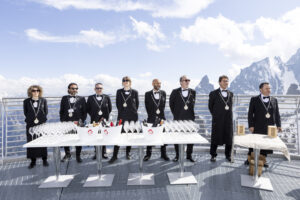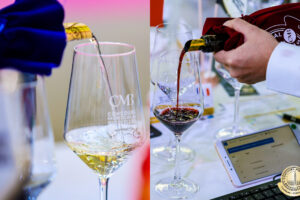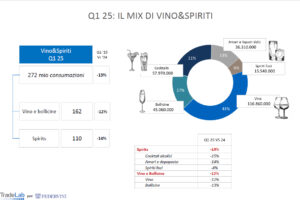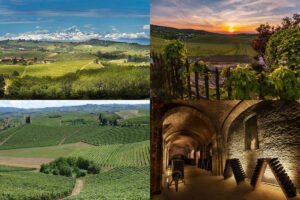For Italians, wine is identity and tradition, but also conviviality and the beauty of being together: in short, in Italy a glass of wine brings everyone together. Among the major generational differences we find the occasions of consumption, which in the young between 18 and 34 years old are usually related to sociability (67.7%), while in the elderly over 65, wine is drunk mainly during meals (79.1%), with adults balancing this statistic (about 55%, in both cases). For 54.8% of Italians, however, choosing a good wine excites them. This is said by the Enpaia-Censis Agricultural World Observatory in its study “Wine consumption by generations. Similarities and differences in consumption patterns by age”, which photographs the evolution over time of Italians' relationship with wine, a product that accompanies them through life cycle as a permanent presence in consumption styles.
“The consumption of wine has a transgenerational character precisely because it is capable of following the evolution of people’s habits in the life cycle”, comments Sara Lena, Censis researcher. “The Observatory reveals some similarities and differences in the relationship of Italians with wine with respect to different generations. The first similarity is that the primacy of the quality guaranteed by the Italian spirit wins, which remains even at the time of inflation. In addition, the cultural aspect is fundamental, because consumers associate material and immaterial values with wine, in which a conscious fruition model made of moderation and responsibility wins. Among diversity, however, generational specificities emerge: young people prefer whites, adults and the elderly prefer reds”.
96.5% of Italians prefer Italian wine, a share that remains high across generations, and 83.1% of consumers prefer PDO and PGI wines. For 96.2% of Italians, Italian wine represents quality, 96.1% taste, 93.8% tradition, 92% identity, and 84.4% sustainability. 87.9% of Italians highly value territorial variations in Italian wines, particularly 80% of young people, 89.9% of adults, and 89.5% of older people. 82.6% of Italians think that climate change will also change the types of wine available, but Italians’ confidence in the ability of wine businesses to meet the challenge of climate change and the challenge of sustainability is high, considering that Italian wineries embody this very value, for 84% of the sample.
Responsible consumption is a constitutive component of the Italian model of relationship with wine and is, at the same time, a transgenerational consumption involving majority shares of people of all age groups. In twenty years there has been an increase in the share of consumers between 18 and 34 years and a decrease in those between 35-64 years and over. As many as 93.8% of respondents think that wine drinking can be educated in moderation and responsibility: 88.4% of young people, 94.3% of adults, and 96.9% of the elderly share this belief. It is therefore not surprising that 75.3 percent of Italians are against initiatives that demonize wine, even in labels. Sharing this rejection are 66.5% of young people, 79.4% of adults, and 73.8%of the elderly.
“Once again consumers, including young people”, says Gian Marco Centinaio, vice president of the Senate, “are choosing the top of the range: Italian products are of quality, representing territories and craftsmanship. Wine tourism is increasingly becoming a widespread phenomenon in our country, resulting in a positive revitalization of the territory, of tourism, including foreign tourism, and of our products. In this sense, politics must help accompany this cultural development without demonizing the product. Wine is not a drink, but a food that should be considered healthy, as it is not bad for your health, if consumed moderately”.
“The Enpaia-Censis Observatory of the Agricultural World has drawn up an important, interesting and useful research, especially in this difficult market period”, says Federico Girotto, CEO of Masi Agricola. “Moreover, we have found confirmation of the relevance of the factors on which Masi has been working for years, including range expansion, the indispensability of anchoring to the territory, emotionality, quality and sustainability: elements that can also be found in the many new products we presented at Vinitaly”.
A certainly positive note and a spur come from Giorgio Piazza, president of the Enpaia Foundation, who concludes by saying, “A positive element emerges from the Enpaia-Censis Observatory on wine consumption by generations, which is that of a 5% increase in young people who consciously drink wine, linking it inextricably to relationality and conviviality, taking into account quality and geographical indication of origin; that is, it is a conscious, responsible and informed consumption. Adults drink wine in a different mode, at lunch and dinner, thus linking it to a more traditional conviviality. However, this is a transgenerational consumption that highlights how wine is a product that intimately accompanies the lifestyle of Italians”.
Copyright © 2000/2025
Contatti: info@winenews.it
Seguici anche su Twitter: @WineNewsIt
Seguici anche su Facebook: @winenewsit
Questo articolo è tratto dall'archivio di WineNews - Tutti i diritti riservati - Copyright © 2000/2025











